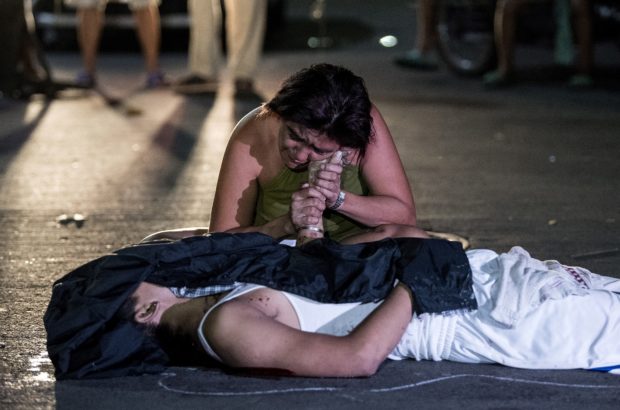Mere technical aid from UN won’t stop PH drug war abuses, killings – groups

Nanette Castillo grieves next to the body of her son Aldrin, an alleged drug user killed by unidentified assailants, in Manila on Oct. 3, 2017. (Photo by NOEL CELIS / AFP)
MANILA, Philippines — Mere technical cooperation between the Philippines and members of the United Nations won’t be enough to check the spate of violence triggered by the Duterte administration’s drug war, according to several groups.
That was their reaction as the UN Human Rights Council (UNHRC) issued a resolution that steered away from launching a probe into the drug war.
It called instead on member states to provide the Philippines with “technical assistance and capacity-building” in its efforts to resolve human rights abuses committed in the implementation of the campaign against illegal drugs.
According to EcuVoice Philippines, families of drug war victims would rather see the prosecution of those behind such abuses — including President Rodrigo Duterte himself — and this would only happen if an independent body, like the UNHRC, would take part in the probe.
“We believe that programs for technical cooperation and capacity building would NOT decisively curb the worsening human rights situation in the country,” EcuVoice said in a statement.
Article continues after this advertisement“Victims and their families, human rights activists and defenders, and communities affected by these violations believe that prosecution and punishment of perpetrators of human rights violations, especially those committed by the highest officials in government, and thoroughgoing and immediate review, amendment, changes and/or repeal of policies instituted in law and practice by the Philippine government are among the crucial indicators in addressing the strong and persistent demands for justice and accountability,” it added.
Article continues after this advertisementAnother group — the International Coalition of Human Rights in the Philippines (ICRHP) — also has pushed for holding perpetrators of drug war abuses liable.
“We have come to a point where the Philippines has gained global notoriety for human rights abuses. However, we are dismayed with how disinformation and empty promises were peddled by the Philippine government before the UN body,” ICHRP chairperson Peter Murphy said.
“Through state-funded public relations they were able to circulate documents that tried to paint a human rights-friendly Philippine government,” he added.
Earlier, the UNHRC passed HRC Resolution No. 45, urging High Commissioner Michelle Bachelet to “provide support for the country in its continued fulfillment of its international human rights obligations and commitments.”
Before that, observers and human rights advocates were expecting the UNHRC to launch a full-blown probe, especially after Bachelet criticized the drug war, saying that the Philippines was near-impunity status.
Despite the UNHRC resolution, EcuVoice said it would keep repeating its call for a “thorough and comprehensive investigation through independent and transparent accountability mechanisms.”
“With this government’s track record of brazen disregard for basic human rights and civil liberties, with its officials’ relentless efforts to vilify human rights defenders […] we have serious reservations that the supposed technical assistance and capacity-building programs will stop the human rights violations,” EcuVoice said.
“We even fear that the government may abuse such programs and use these as a smokescreen to conceal their apathy and disregard toward the victims or to commit reprisals against activists and human rights defenders engaging in the process,” it added.
Duterte has become an even more controversial figure ever since he ascended to the presidency in 2016 when he started to extend on a nationwide scale his local war against illegal drugs in Davao City, where he was the mayor.
While the drug war achieved some success, human rights advocates criticized it for being bloody and violent, marred by the accusation that state forces were involved in extrajudicial killings.
But during his address last Monday night, Duterte said he was also bothered by the EJK talks, prompting him to call for a “discreet” probe — which was disputed by various groups.
[atm]